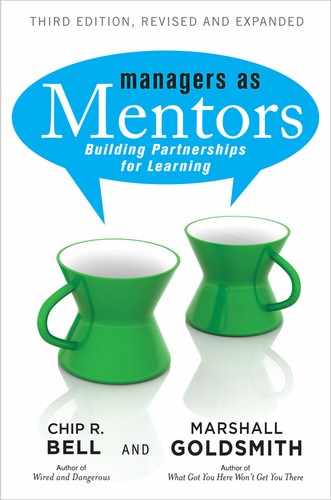Managers As Mentors, ReVISITED
We are big fans of new. We rarely go to the same restaurant twice, even if it was a great experience. The concept of a time-share—returning each summer to the same condo—leaves us absolutely cold. Why, we won’t even eat leftovers unless the only other option is to skip a meal!
This is the third edition of this book. You would think we would abhor the idea of spending time on the “leftover” version of a book. But we were excited by the opportunity! This edition is not a warmed-over version of yesterday’s dish, served up with a different sauce on the side. We think you’ll discover it has enough new and different ingredients not to be considered a leftover at all; rather, it is a completely new experience.
This new version is different in a number of ways. There are many chapters in this edition not found in the first or second. We have learned a lot both from the feedback of readers of the second edition and from participants in the mentoring workshops we have conducted and keynote speeches we have delivered. They helped us crystallize our thinking and enabled us to get a lot clearer on concepts that were somewhat vague in the second edition. We are grateful for the learning they provided us.
You will discover soon that Managers as Mentors is crafted around a mnemonic—SAGE—that forms the structure of the mentoring experience as we see it. Surrendering (S) is all about actions that make mentoring a power-free experience. We have learned that power, authority, and command—or at least the protégé’s perception of these traits in the mentor—can doom the mentoring experience to a perfunctory dialogue … sans risks, sans spirit, and sans discovery.
Accepting (A) in the SAGE model focuses on the value of a safe, nontoxic relationship. When the protégé believes he or she is in a relationship that is not dangerous, growth-producing risk and experimentation are more likely to occur. The perception or prediction of danger is related not to physical harm but rather to the emotional damage caused by rebuke, judgment, or criticism—all of which yield a loss of protégé self-esteem in front of an important person. Why is this important? Without risk there is no learning; without experimentation there is no progress.
Gifting (G) is positioned as the main event in mentoring. Many mentors start their mentoring relationships with a gift of advice, feedback, or focus. However, when offered as the first step in the relationship, the act of bestowing such gifts risks their being at best undervalued, at worst ignored, resisted, or rejected. If Gifting follows Surrendering and Accepting, it is more likely to be experienced by the protégé as a sincere gesture and a valued contribution worthy of attention, tryout, and effort.
Extending (E) in the SAGE is about the creation and nurturance of the protégé as a self-directed learner. It is also about ways to extend the learning of the protégé beyond his or her relationship with the mentor. Essentially, it is shepherding the transfer of learning.
